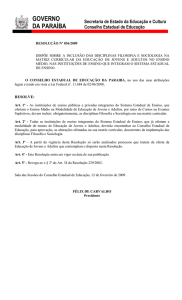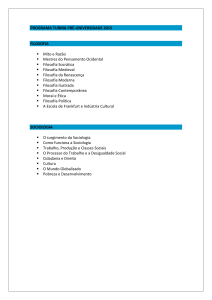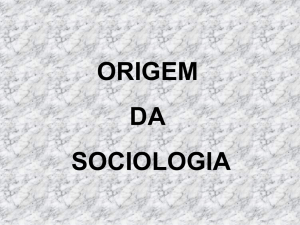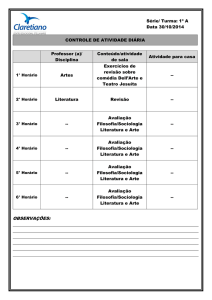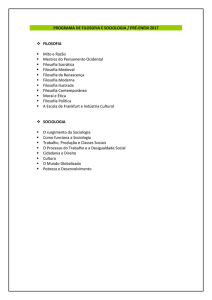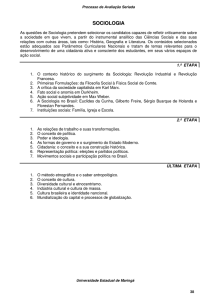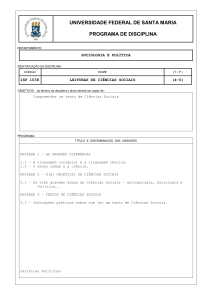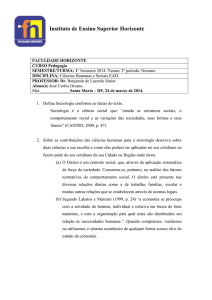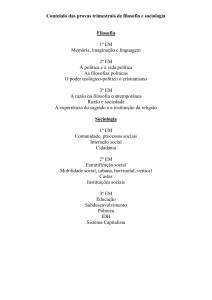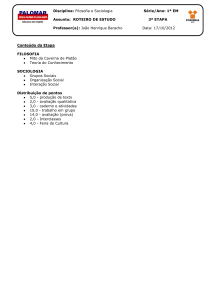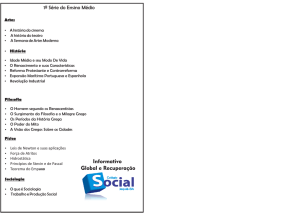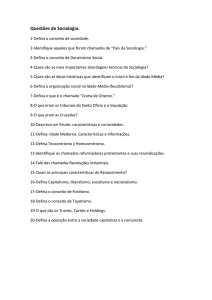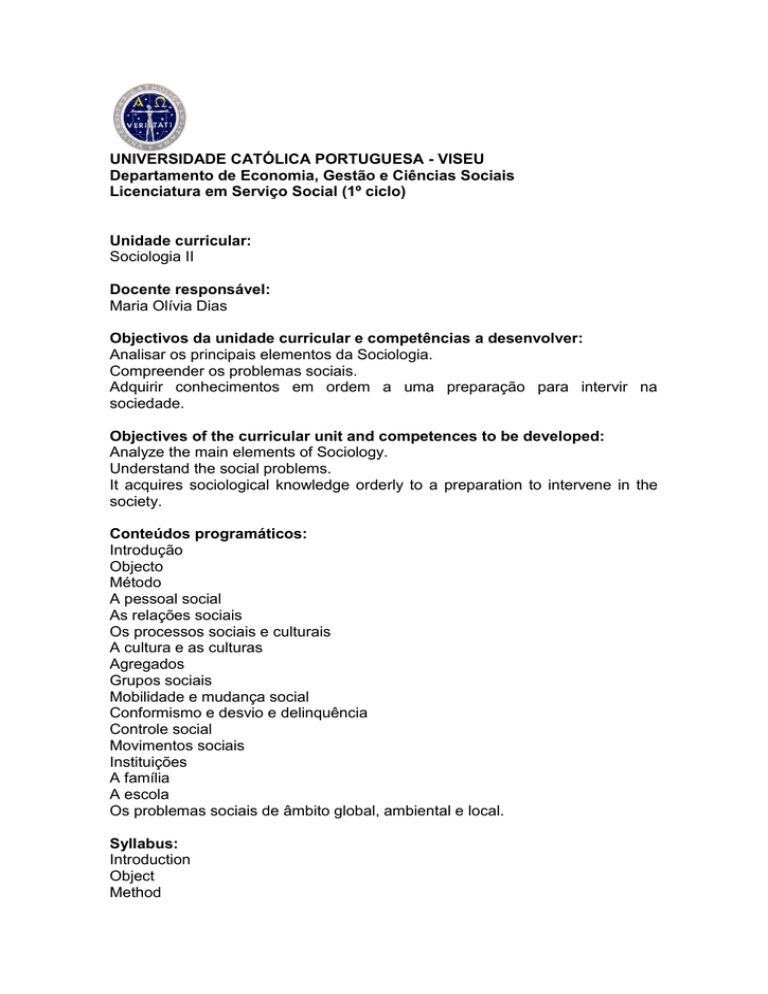
UNIVERSIDADE CATÓLICA PORTUGUESA - VISEU
Departamento de Economia, Gestão e Ciências Sociais
Licenciatura em Serviço Social (1º ciclo)
Unidade curricular:
Sociologia II
Docente responsável:
Maria Olívia Dias
Objectivos da unidade curricular e competências a desenvolver:
Analisar os principais elementos da Sociologia.
Compreender os problemas sociais.
Adquirir conhecimentos em ordem a uma preparação para intervir na
sociedade.
Objectives of the curricular unit and competences to be developed:
Analyze the main elements of Sociology.
Understand the social problems.
It acquires sociological knowledge orderly to a preparation to intervene in the
society.
Conteúdos programáticos:
Introdução
Objecto
Método
A pessoal social
As relações sociais
Os processos sociais e culturais
A cultura e as culturas
Agregados
Grupos sociais
Mobilidade e mudança social
Conformismo e desvio e delinquência
Controle social
Movimentos sociais
Instituições
A família
A escola
Os problemas sociais de âmbito global, ambiental e local.
Syllabus:
Introduction
Object
Method
The social person
Tipology of people
The social and cultural relations and processes
The culture
The aggregates
The socials groups
Mobility and social change
Compliance and shunting line and delinquency
The social control
Social movements
Institutions
Family
School
The social problems of global, ambient and local scope.
Demonstração da coerência dos conteúdos programáticos com os
objectivos da unidade curricular:
Os conteúdos desta unidade curricular, Sociologia II, são a continuação da
unidade curricular Sociologia I. e por isso privilegiam-se na sua continuidade a
abordagem dos elementos e das relações que estes têm entre si.
Far-se-á uma análise de continuidade, baseada na consulta, interpretação e
análise de textos científicos,
complexos que conduzam os estudantes a conhecimentos aprofundados da
realidade social.
Demonstration of the syllabus coherence with the curricular unit's
objectives:
The contents of Sociology II are the continuation of Sociology I and so the focus
is on continuity in addressing the elements and the relationships they have with
each other.
Far will be an analysis of continuity, based on consultation, interpretation and
analysis of scientific texts,
complexes that lead students to in-depth knowledge of social reality.
Metodologias de ensino (avaliação incluída):
Aulas de exposição
Trabalhos em grupo com apresentação e discussão em aula
Um teste escrito com peso de 60%. Trabalho de grupo com peso de 25%.
Assiduidade 15%.
Teaching methodologies (including evaluation):
Lessons of exposition
Accomplishment of Works in group with presentation and quarrel in lessom
One has tested written weight of 60%. Work of group with weight of 25%.
Assituity 15%.
Demonstração da coerência das metodologias de ensino com os
objectivos da unidade curricular.
As metodologias desta unidade curricular privilegiam o envolvimento dos
estudantes no processo ensino
aprendizagem, centrado na procura, interpretação e análise de artigos e outros
textos científicos, assumem-se como o garante da consecução dos objectivos
da unidade curricular. Na continuidade da Sociologia I, promove-se o
envolvimento dos estudantes em projectos de investigação coordenados pelo
docente da unidade, permitem a ponte entre os aspectos teóricos e a prática na
investigação científica dos problemas sociais.
Demonstration of the teaching methodologies coherence with the
curricular unit’s objectives.
The teaching methodologies of this CU emphasize student involvement in the
learning process, driven by demand, interpretation and analysis of scientific
articles and other texts, they act as the guarantor of the objectives of the
curriculum. In continuation of Sociology I, student involvement in research
projects coordinated by the teacher of the unit is promoted, allowing the bridge
between the theory and practice in scientific research of social problems.
Bibliografia principal:
AMARO, F. (2006) – Introdução à sociologia da família, Lisboa: UTL
BERGER, P. L. et al (1987) – A construção social da realidade, Petropólis:
Vozes
BOUDON, R. (1996) – Tratado de sociologia, Porto: Asa
COHEN, B. (1980) – Sociologia geral, S. Paulo: McGraw-Hill
COSTA, A. F. (1992) – Sociologia, Lisboa: Difusão cultural
FIONA, W. (2010) – Repensar as famílias, Cascais: Principia
GIDDENS, A. (2005) – Sociology, Cambridge: Polity Press
LAKATOS; E. M. et al (1999) – Sociologia geral, S. Paulo: Atlas
MESQUITELA, A. L. (1992) – Introdução à Sociologia, Lisboa: Presença
PORTO, M. S. G. (2006) – Sociologia em transformação: pesquisa social do
século XXI, Texas: Tomo Editorial.
ROCHER, G. (1999) – Sociologia geral – A acção social, Lisboa:Presença
ROCHER, G. (1980) – Introduction à sociologia génèral, Montrèal: Hurtubise
RODRIGUES, F. et al (1993) – Acção local e mudança social em Portugal,
Lisboa: Fim do Século
SILVA, J. P. (2007) – Por uma sociologia do século XX, Annablume

